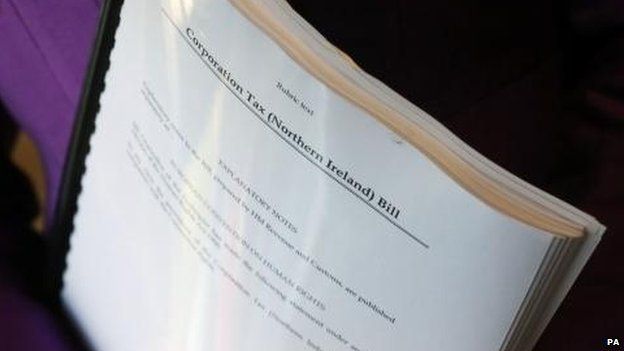Corporation tax devolution to cost NI £300m says David Gauke
- Published

The devolution of corporation tax to Northern Ireland will mean Stormont's block grant being cut by £300m a year, according to a Treasury minister.
David Gauke made the comment during a Commons debate on the legislation that will devolve the power to Stormont.
The current UK corporation tax rate is levied at 21%, but it is just 12.5% in the Republic of Ireland.
Mr Gauke said the £300m figure was an estimate based on a Northern Ireland rate of 12.5%.
A cut in corporation tax would mean less revenue is collected for the Treasury, and under European rules Stormont would have to make up the shortfall.
'Detailed mechanism'
Mr Gauke added the actual figure would depend on a number of factors including growth in the economy.
Stormont's current budget for day-to-day spending on public services is just under £10.2bn, so a £300m cut would be equivalent to just under 3% in cash terms.
Mr Gauke also said the Treasury is working with the Executive on a "detailed mechanism" for adjusting the block grant.
The Secretary of State Theresa Villiers told the House of Commons that devolving corporation tax could have a "transformative effect" on Northern Ireland.
However, the Shadow Secretary of State, Ivan Lewis, said the power could "perpetuate horrendous levels of inequality" if not managed carefully.
He denied that the Labour Party had performed a U-turn by deciding not to oppose the legislation.
'Draconian'
The former Secretary of State, Owen Paterson, who was an energetic advocate of devolving the tax, said the move would be "as big as the Belfast Agreement".
He dismissed concerns over the cut to Stormont's block grant as a result of devolving the tax, saying that it will promote growth in the overall economy.
However, some Northern Ireland MPs raised concerns at the effect on the block grant.
The rules mean that Stormont would therefore have to hand back a chunk of its annual budget to make up for that.
DUP MP Sammy Wilson said finding the money immediately from the block grant would be "very, very difficult."
Mr Wilson said he supported the devolution of the power, but that the formula for adjusting the block grant "must not be draconian".
Alliance Party MP Naomi Long said there would be "very difficult decisions" to make on funding the tax cut.
'Rebalance'
She also called for companies that benefit from a cut in the tax to be charged a small "skills levy" that would pay for skills training.
SDLP MP for Foyle, Mark Durkan, said the devolution of corporation tax should be used to "rebalance the region".
He said his constituency needed investment in infrastructure and higher education if it was to benefit.
Meanwhile, some English MPs raised concerns about what devolution of the tax would mean for the UK as a whole, with Liberal Democrat Ian Swales seeking assurances that transfer pricing rules would be strictly enforced.
- Published8 January 2015
- Published3 December 2014
- Published20 November 2014
- Published30 November 2014